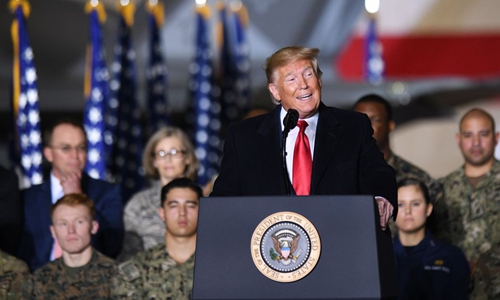HOME >> OPINION
‘America First’ rips into US alliances
By Robert A. Manning Source:Global Times Published: 2020/1/30 18:23:40

U.S. President Donald Trump speaks at a signing ceremony for the National Defense Authorization Act for Fiscal Year 2020 at Joint Base Andrews, Maryland Dec. 20, 2019. Photo: Xinhua
One rule of thumb that helps understand the turmoil and uncertainty afflicting global affairs is an axiom derived from lessons of history: international systems work to the extent that major powers are invested in them.Viewed through that lens, Trump's "America First" unilateralism explains much of the turbulence, as the US-led post WWII rules-based order and US alliances and partnerships vital to the success of US policy are unraveling.
It begins with Trump's transactional view of alliances and partnerships. He views it in zero-sum terms, like a real estate deal: unlike the traditional view of alliances reflecting shared values and mutual national interests; for him, it is just a business deal and the US should turn a profit. To Trump, standing US commitments to allies and treaties - the word of the US - mean little.
This view helps explain much of Trump's behavior toward allies and adversaries. The US, he threatened, would leave NATO unless allies spent more on defense. Though NATO has a non-binding commitment to spend 2 percent of GDP on defense, Trump mistakenly argued that those not meeting that target owe money to the US.
Similarly, talks on host nation support for US troops with South Korea have failed after six rounds as Trump demanded a 500 percent increase in Seoul's funding. South Korea already pays $925 million a year, about 50 percent of the cost of 28,000 US troops. In 2018, Trump demanded South Korea should pay for the deployment of the THAAD missile defense system even though under the deal with US, Seoul would provide the land and maintenance and Washington would pay for the missile system.
After Iraq's Parliament passed legislation requesting the US to withdraw its military forces, Trump thundered that he would hit Baghdad with massive sanctions unless they paid for a US military base.
And not the least, there is Trump's effort at extortion in Ukraine, threatening to withhold vital US military aid, unless Kyiv dug up political dirt about former vice president Joe Biden that Trump could use in the 2020 elections. That led the US House of Representatives to impeach Trump, a permanent stain, whether or not the Senate convicted him.
Trump either fails to understand or simply rejects the prevailing US strategic concept of forward defense underpinning US alliances in Europe and Asia. The US security guarantor role in Europe and especially in Asia over the past 70 years has been key to peace and prosperity.
Similarly, with regard to international institutions, which he rejects as "globalism," Trump's unilateralism has begun to unravel the global system. The US has blocked the appointment of judges to the WTO dispute settlement mechanism (though Washington has won most of its complaints filed in the WTO), paralyzing the body, though widely supported reforms may save the WTO if the US cooperates. This anti-globalist logic led Trump to withdraw from TPP, the Paris Climate Accord, the INF treaty with Russia, and the Iran nuclear accord signed by the five permanent members of the UN Security Council plus Germany, and the UNESCO, to mention a few.
This sense of US retreat has led to many allies and partners to accelerate hedging against US unreliability, and to begin to move on without the US. German Chancellor Angela Merkel remarked that Europe can no longer rely on US protection and "must take destiny into its own hands."
Europe is stepping up efforts to make the euro more of a reserve currency, discussing strengthening EU defenses, and signing an array of trade agreements: EU-Japan, EU-Mercosur, and with Mexico, Singapore, Vietnam, Australia, Chile - 40 in total.
Similarly, after Trump left TPP, Japan's Prime Minister Shinzo Abe revised the accord and moved it forward with the US. All US Asia-Pacific allies and partners are moving ahead with Regional Comprehensive Economic Partnership (RCEP) from which the US is excluded.
In addition, in recent years a rapidly growing trend is intra-Asian security cooperation: India-Japan, Japan-Vietnam, Japan-Indonesia, India-Vietnam to mention just a few.
When you place this array of developments against a background of tense and unsettled US relations with key major powers - China and Russia - it amplifies the fragile and fraying world order.
The world is closely watching the US presidential election campaign. If Trump is re-elected - and not many would bet against it - expect more of the same, only worse. The sober advisors like former secretary of defense James Mattis, ex- White House chief of staff John Kelly and former secretary of state Rex Tillerson are long gone. Now Trump is surrounded by loyal advisors enabling a president who appears increasingly impulsive and erratic.
If the Democrats win the election, which is a fair probability if they choose a centrist candidate, don't expect things to return to the pre-Trump status quo. Trends altering the US role preceded Trump. But we would almost certainly see a more familiar US policy. They would reverse Trump's policies on environment, climate change, extend the New START nuclear accord with Russia, and more broadly seek to shore up US alliances and the US role in the multilateral system that the US was instrumental in creating after WWII.
Either way, expect a wild ride in 2020 and beyond. The great fear is that it may take another major or global depression before it is understood that stability requires great powers to find a balance of interests.
The author is a senior fellow of the Brent Scowcroft Center for International Security at the Atlantic Council and its Foresight, Strategy and Risks Initiative. Follow him on Twitter @Rmanning4. opinion@globaltimes.com.cn
Posted in: VIEWPOINT